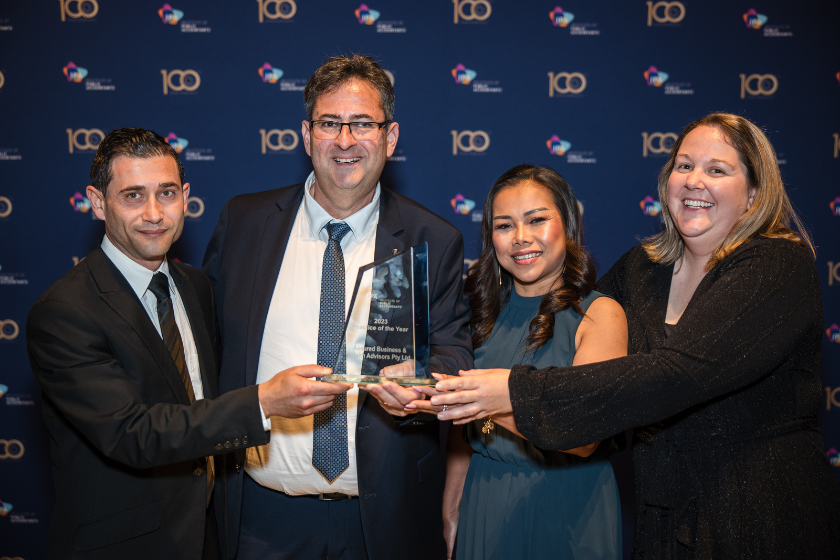This policy could make women's super more vulnerable to financial...
Australia’s opposition says early access to superannuation is an election policy for the party’s campaign. But...
READ MORE
Assured Business and Wealth Advisors was recently named IPA Practice of the Year. We asked Managing Director Paul Tsimopoulos FIPA how he’s built a business that, even after 32 years, is still growing, changing, and delivering what clients want now.

Paul Tsimopoulos, Managing Director of Assured Business and Wealth Advisors, says his business earned the title of 2023 IPA Practice of the Year thanks to the management of two key risks:
Tsimopoulos’s practice, with a headcount of four, helps to manage the finances and fortunes of more than 1,000 clients. It could be easy to deprioritise personal service, lose track of the unique needs of each client and treat each the same as the last.
And in any business, there’s the risk of culture – the values and goals that drive each action and decision – being degraded or unintentionally shifting over time. If leadership does not ensure employees’ values and goals remain aligned with each other’s and the business’s, it’s dangerously simple for employees to become disengaged and stop improving their capabilities, processes and service delivery.
“We’re like a small family in this business, we look after each other and we support each other,” Tsimopoulos says.
“At the same time, we’re here to improve our learning. If there’s something in our skillset that’s lacking, we’ll always try to find out what we should do better for our clients.”
Paul Tsimopoulos: First, we make sure everybody knows that this is a business. There are certain metrics we need to achieve. We all respect each other and we don’t want to let the others down. But importantly, when something goes wrong, we will look at why. We will not look to blame anybody. We will look for which process in our system didn’t work. We will look at those processes, then fine-tune until we find what works for us.
We also know that we can always do something better, so we stay on top of professional development.
Finally, we do outings frequently, to cafes and restaurants, sometimes as a team and sometimes with families. And as a team, we work together to support charities, too.
PT: We started practicing in 1992. For years after that, we felt we should be doing more for clients. They trust us with their personal financial details and we knew there were better opportunities to help them.

But we were limited in advice we could provide. We strongly believed accounting services tie in beautifully with lending and financial planning, meaning we could help with clients’ retirements, superannuation, tax, paying down debts, accumulating wealth, passing down wealth from generation to generation and more.
So, in 2005, we became accredited mortgage brokers, and in 2013, we became licensed in financial planning. From there, we could offer complete advice.
[h2] Q What superpowers does this deep knowledge about clients combined with a wide view of finance offer you?
PT: We want our clients to make smarter decisions. So, if there are any issues with cash flow or debt management, we can help them to solve the problem before it becomes a major one.
In 2016, we started recording how much our advice has saved our clients – we have saved our clients, collectively, an extra $2.4 million in tax since then.
When we see clients take our advice, whether it’s for accounting, lending, planning or a combination of everything, we see the impacts on them.
PT: I think clients are expecting something different. They expect their advisers to step up and provide more than bookkeeping and tax.
But if you’re going to be advising, you need to be an adviser. You need to do the work, get involved and understand the client’s business. You need to understand their concerns, how their business operates, etc., and provide them with proactive advice on how to solve any issues.
It’s more satisfying for us, because we see what it means to the client. They can have a holiday, they can pay down their debt, they can breathe easier now they’ve got a bit more cash flow available.
PT: I think the important thing is not to assume you know what the client wants. We must listen to the client. Let them speak. Draw down on what their concerns are and treat them with respect. Don’t assume they are the same as another client.
Once they trust you, they will tell you what their concerns are. Then you can provide solutions in a way they understand. That leads to greater trust, and they will follow your advice.
PT: We are always looking at improving. We ask for feedback through client surveys. And we implement changes because of those surveys. It’s very important not just to know the concerns, but also to show the clients that we are acting on them.